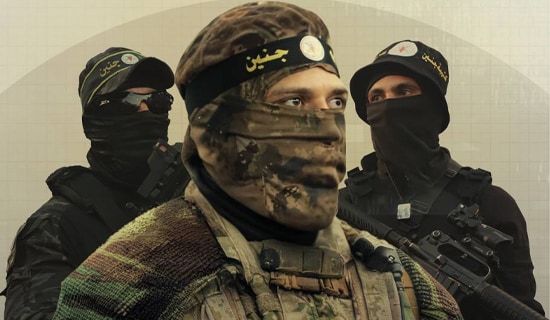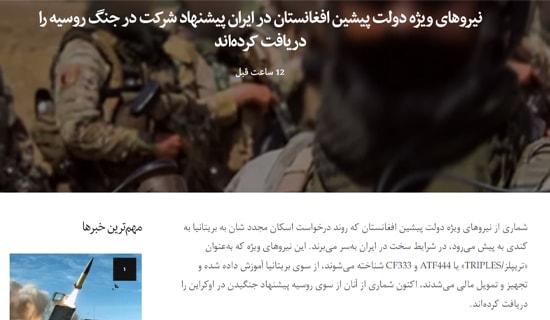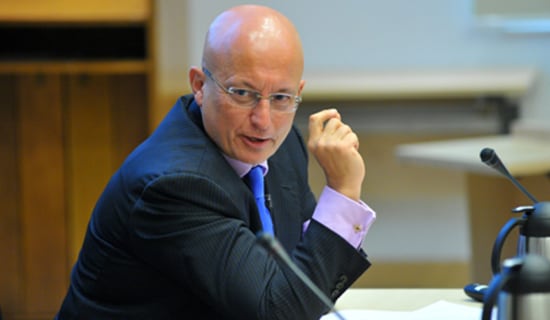Introduction
The death of Mahsa Amini, the 22-year-old Iranian woman who died on September 16, 2022 while in custody of the Iranian morality police, has sparked public protests across the country. Ms. Amini, from the Kurdish region in western Iran, was visiting family in Tehran when she was arrested by the morality police and was taken to its facility for "reeducation" in wearing the hijab, which she had allegedly worn improperly. According to the regime, she "fainted in police custody... and died shortly afterwards in a nearby hospital";[1] according to her family, she was perfectly healthy at the time of her arrest, but was beaten and became comatose, dying a few days later of brain damage.
The Saudi-funded London-based Iran International channel published CT scans it said were Ms. Amini's, obtained by hacking into the hospital's network. It said that they showed "the presence of fluid and blood in her lungs" and that "according to doctors, the accumulation of fluid in the lungs was caused by her becoming comatose following a powerful blow to the head."[2]

Ms. Amini and CT scans published by hackers who obtained them from the hospital in which she died (Source: Iranintl.com, September 19, 2022)
News of Ms. Amini's death sparked a wave of demonstrations in Tehran and in the cities of the Kurdistan region in Iran. The protests against suppression of individual freedoms, particularly the rights of women with regard to the Islamic dress code in the country, spread to 14 provinces and more than 80 cities, and grew in intensity. Protestors shouted "Death to the Dictator" against Iranian Supreme Leader Ali Khamenei, and threw stones at pictures of him. Many women were seen removing and burning their hijabs and cutting off their hair. Dozens were reported killed in the regime's violent suppression and dispersion of the protests, and the regime disrupted Internet service in the country.
MEMRI translated and published clips from the protests:
For both sides – the regime, which enforces an Islamic appearance (hijab)in public spaces, and those who oppose the enforcement of the Islamic dress code – this is a political struggle over Iran's identity. Women's removal of their hijabs symbolizes not only opposition to the religious dress code, but also opposition to Iran's Islamic revolutionary regime.
In advance of his annual speech at the U.N. General Assembly, Iranian President Ebrahim Raisi explained the regime's position on forcing women to wear the hijab in public spaces. Speaking in a CBS "60 Minutes" interview that aired September 18, he insisted that Iranian women accept the hijab of their own free will as a cultural norm that is customary in the Islamic space, and added that, while the regime does not interfere in what happens in the home, women must obey the law of the land when out in public.

Protests in Iran (Source: iranintl.com, September 25, 2022)
According to a transcript published on his official website, Raisi said in the interview: "Muslim people, and our women and girls, have morals and spirit that are deeply rooted in [our] civilization and culture, and they are not a matter of this year, last year, or 40 years ago [the beginning of the Islamic Republic of Iran], or 100 years ago. In fact, it can be said that for centuries the residents of this country lived with the hijab and modestly, respecting the necessary privacy... No one ever taught the women, or gave them private lessons at home, [on wearing the hijab]; they themselves see it as an obligation. This is what the public believes... What is certain is that no one interferes with people's private lives, and no one in any way attacks the private lives of the citizens. [But] in the social [i.e. public] space, the citizens themselves follow the rules – that is, they know that there is a rule and everyone obeys it. Even if there is a violation of any kind, in a range of issues, no one [i.e. no police or anyone who enforces the law] can overstep the limits of his authority."[3]

Raisi on "60 Minutes," from his website President.ir/fa
In contrast to these statements, over the past summer the Raisi government has implemented a harsh ideological line – an aggressive public campaign for more stringent enforcement of the laws on hijab and Islamic dress in public. The hijab, which leaves the face exposed and is accepted headgear for women in many Islamic countries, is compulsory in Iran, and is presented by the regime not only as a means of preserving women's modesty but also as a weapon for defending the values of family, society, and religion in the "cultural war" that the regime claims the West is waging against Iran.[4] Indeed, in the regime's religious media campaign to enforce the Islamic dress code on women, political, religious, and military elements, in the media and in cyberspace, have all stressed the narrative of the cultural war, according to which modesty and the hijab are being undermined because of the efforts of the enemy – the "arrogant" West – against Islamic Iran to undermine the values of Iran's Islamic society.[5]
The Iranian regime has come out against the "hijab-less women" and "women who are careless with their hijabs" (i.e. who cover themselves only partially, which religious authorities also consider insufficient). One of the main regime bodies promoting the hijab is the Headquarters for Enjoining Good and Forbidding Evil, which is in charge of the morality police, and whose name is taken from Quran 3:110 which, according to the regime, forms the religious basis for enforcing hijab wear.
Women caught in public with their hijabs "carelessly" worn, or without one at all, are send to stations operated by the headquarters where they are instructed in proper hijab wear and encouraged to appreciate the Islamic dress code. Furthermore, under the hijab law, the Raisi government is demanding that all levels of the country's executive authority as well as public institutions and private businesses refuse to serve women who are not properly covered – in government offices, municipal offices, banks, public transportation, stores, hair salons, and so on.
Even Iran's military and security organizations are involved in the regime's regular indoctrination campaigns aimed at inculcating modesty in women. Senior military officers have spoken on behalf of the military at an "education festival" titled "Fatima's Gemstones" to promote modesty, focusing on women's right and obligation to wear the hijab as a Quranic directive. In their statements, the officers stressed that women's personal fulfillment in life and in their careers, as well as their educational and scientific ambitions, will be attained if they dress properly. They added that women have a role to play in the Islamic revolution as flagbearers. Furthermore, Iranian Armed Forces spokesman Gen. Abollfazl Shekarchi attributed all the ills and maladies of Iranian society to women who are careless about their hijabs, saying: "The results [of their] carelessness with the hijab is a rise in divorce, in tension in families, in mental illness and depression and in the insecurity in society. Likewise, this has caused great damage in the country in production and the economy, and, most importantly, it is preparing the ground for maneuvers by the enemies of the revolution."[6]
While the prevailing view in the discourse in Iran is pro-hijab in some form or another, there are voices, primarily in the reformist camp, that oppose and are critical of the regime approach – either of the law compelling it to be worn or of the regimes' forceful and excessive enforcement of it.
This two-part report will review the stricter guidelines for hijab wear recently issued by regime officials, including police and public institutions, as well as the various approaches for and against enforcing the hijab that are being expressed in public discourse. It also features illustrations from a series on "Headgear Do's and Don't's" by Sajjad Jafari, a cartoonist identified with the ideological camp in Iran.
Senior Regime Officials Issue Guidelines For Enforcing The Hijab Law
Regime officials, including Supreme Leader Khamenei, President Raisi, regime ayatollahs, and police and military commanders have all spoken about women's obligation to wear the hijab in public.
Supreme Leader Khamenei Lectures Clerics On The Importance Of Hijab: With Regard To Women, "I Am Not On The Defensive, But On The Offensive! It Is [The West] That Should Be Defensive... [The West] Has Commodified Women... It Is We Who Prosecute [The West] On The Issue Of Women... Iranian Women Have Emerged In All Fields, Successfully And Proudly, Wearing The Islamic Hijab"
In a July 27, 2022 meeting with imams who lead Friday sermons, Supreme Leader Ali Khamenei emphasized that ,in contrast with the West's perceptions, the hijab does not stop Iranian women from rising in the ranks:
"The truth is that Western superpowers are a mafia headed by the Zionists, prominent Jewish businessmen, and their subordinate politicians. America is their show window, and they are everywhere; this is the power of the West. Well, it [the West] cannot tolerate [Iran's challenge to it]. Every day, it [the West] thinks about doing something to harm the Islamic Republic [of Iran.]
"Allow me to present an example which is relevant to this day: the issue of women in Islamic society. They [Westerners] have obviously been raising the issue of women since the revolution began. They brandished exaggerated claims of wanting to support Iranian women, and so on. Recently, they raised the issue of women again, on the pretext of the hijab, repeating the same failing attempts.
"Well, once, a few years ago, during a certain conference, someone asked me how I defend myself against the West on the topic of women. I said that [on this topic] I am not on the defensive, but on the offensive! It is they [the West] who should be on the defensive, they who must give answers. It is they [the West] who commodify women. [Why should I] defend myself? I do not defend myself. It is we who prosecute [the West] on the issue of women.
"Why are you seeing the propaganda outlets, official and government media of America, England, and several other places [and] their mercenaries suddenly attack the women's issue and finding a pretext [like] the issue of hijab, etc.? Why are they doing this? Do they really want to protect the rights of women and Iranian women? Are these not the same people who would shut down the water supply of this nation if they could? Do they care about Iranian women? They imposed an embargo on medication for children suffering from epidermolysis bullosa [a severe dermatological condition] – they are children! [They imposed] a total embargo on the Iranian people. Do they care about Iranian women? Can anyone believe that?
"What is this all about? The truth is that the respectable and talented Iranian woman has dealt one of the worst blows to Western civilization. [That is why] they are nervous – [because] this was done by women. Other than the movement of the Islamic Republic, the Iranian woman, specifically, has dealt one of the most significant blows to the West's claims and lies. How so? For years – 200 years – they [Westerners] have been saying that unless women are freed from the limitations of morality, the shari'a, and so on, they will not be able to progress. Women will be unable to attain a position in science, politics, society, etc., so they say. The condition for women to be able to rise to prominent social and political roles is that they forsake these moral restrictions.
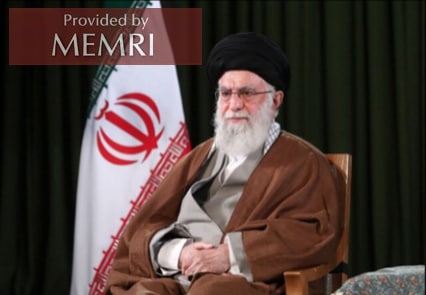
Khamenei
"The Iranian woman has actively disproved this; Iranian women have emerged in all fields, successfully and proudly, wearing the Islamic hijab. These are not vague claims, but a substantial reality in our society. Fifty percent or more of those enrolled in our universities are our daughters, our wives. In our sensitive and important science centers, some of which I have visited personally, women scientists play a role. In literature, poetry, novels, biographies, it is women who stand out. In competitive sports – sometimes people really fail to appreciate [female athletes] as they should. The Iranian girl stands on the podium in first place, raising the flag and national anthem of Iran, before hundreds of millions of viewers around the world – wearing a hijab [and] refraining from shaking the hand of the man who gives her the medal, thus upholding shari'a restrictions. [Is this] a minor thing?...
"In the tasks of running the country, our women, in their hijabs and chadors, have fulfilled their roles in the best possible way. [The also did this] in science, in literature. The [Iranian] broadcasting authority presenters are superb. Iranian women have a presence across a range of fields, at the highest echelons, in their Islamic hijabs, upholding the Islamic hijab; this is a very important thing.
"This negates the Westerners' efforts over the past two or three hundred years. They cannot bear it, they are angry, they are banging [their heads] against the wall [in frustration at not being] able to do anything – and then they latch onto the issue of the hijab, clinging to one issue and using it for propaganda..."[7]
Iranian President Raisi: "The Enemies Of Iran And Islam Have Attacked The Cultural Strength Of Society And Its Fundamental Religious Principles, Using A Great Many Cyber And Satellite Networks And Promoting Corruption"
At a July 5, 2022 meeting of the Supreme Council of the Cultural Revolution, President Raisi focused on the issue of hijab and modesty, instructing the Council Secretariat to devote the proper attention to enforcing the law passed by the Majlis and by the Supreme Council of the Cultural Revolution in 2005. The law sets out compulsory hijab and all government institutions' responsibility to enforce this, in cooperation with all regime cultural institutions.

Raisi, center (Source: President.ir/fa, July 5, 2022)
Reiterating the narrative of Iran's cultural war against the West, Raisi argued that the West's promotion of corruption in Islamic Revolutionary society is an "organized, planned act aimed at weakening and destroying the spiritual foundation and religious values [of Iran] through major efforts by the arrogance [i.e. the U.S.] and the enemies of the Iranian nation."
He said: "The enemies of Iran and Islam have attacked the cultural strength of society and its fundamental religious principles, using a great many cyber and satellite networks and promoting corruption. The necessary steps must be taken to deter this organized and wide-ranging attack, and the institutions responsible must take systematic and coherent steps in this area..."[8]
Ayatollah Ahmad Hatami In Tehran Friday Sermon: "Many Of The Women Who Do Not Wear Hijab Are Actually The Wives And Daughters Of Thieves... Upholding The Hijab Is Crucial To The Religion, And Failing To Uphold It Is A Sin"
In a Friday sermon in Tehran on July 8, 2022, Ayatollah Ahmad Khatami stated that the hijab is intended to honor women. Connecting the failure to wear it to a lack of morals, he argued that a woman who does not wear hijab us usually the daughter of a thief or an embezzler, and that not wearing it is a sin and a betrayal of society. The hijab obligation, he added, is Quranic and thus cannot be rejected. The following are the main points of his sermon:
"The philosophy of the hijab is honoring women. A woman is the pearl of modesty, [and with] her hijab, she can play a role in society. Islam aims to preserve her character, and make her a serious and efficient figure.
"Insisting on the hijab does not mean ignoring other infractions. Friday preachers, and I am among them, have focused greatly on the issue of theft and embezzlement. The judicial system has also done good work in addressing this issue. But many of those who do not wear the hijab are actually the wives and daughters of those same thieves.
"[The issue of] the hijab is mentioned in more than 10 Quran verses, making it impossible for anyone to accept the Quran without accepting the hijab. Jurisprudential authorities have also emphasized that upholding the hijab is crucial to the religion, and that failing to uphold it is a sin...
"Nowadays, the hijab issue is central, since every government in the world that wants to fight Islam begins with fighting the hijab. In this context, the Supreme Council of the Cultural Revolution passed an excellent resolution about modesty and the hijab, which 32 institutions are responsible for implementing. This will bring positive results in the issue of modesty and the hijab. Taking arbitrary action against women who do not wear hijab [i.e. by civilians on their own initiative] is a felony. Dealing with [cases of failure to] wear the hijab must be within the law. Arbitrary action [with no legal authority] is forbidden in the regime of the Islamic Republic and is against shari'a.
"Calling the wearing of the hijab 'compulsory' is a mistake. If a society wants to be organized, everyone must obey the law. Failure to wear the hijab is an offense to the emotional security of society and a betrayal of its citizens..."[9]
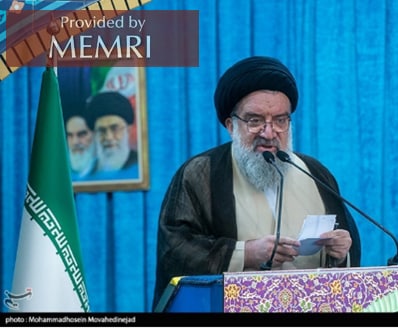
Ayatollah Ahmad Khatami, Tehran Friday preacher (Source: Tasnim, Iran, July 8, 2022)
Ayatollah Alam Al-Hoda, Friday Preacher In Mashhad, To Ali Rezai Adiani, Director Of Ideological-Political Organization In Iranian Police: "We Must Make Jihadi Efforts And Everyone Must Find A Role And A Responsibility In This Cultural War... In The Area Of Cultural War And Against The Enemy's Soft Invasion, The Police Are At The Front"
In a July 5, 2022 discussion with Ali Rezai Adiani, the director of the Iranian Police ideological-political organization, Ayatollah Ahmad Alam Al-Hoda, a close associate of Supreme Leader Khamenei who serves as his representative in Khorasan Razavi province, stated that the women's hijab is the siege wall against Western infiltration of the holy city of Mashhad. Ayatollah Alam Al-Hoda went on to say that if the sanctity of Mashhad is preserved, other cities in Iran will not fall into the West's trap, and stressed the importance of the police – the executive arm in enforcing the women's dress code – as a fighting force in the cultural war against the West.
He said: "It is the nature of the enemy to dissuade us from carrying out revolutionary activity, and therefore if we wish to advance religious rituals we must no longer fear media manipulations and character assassination operations carried out by elements identified with the enemy.
"[The city that is sacred to the Shi'a,] Mashhad, is the main target of the enemy's cultural conspiracies. It is the spiritual fortress of the country, and if the enemy can destroy the morality and religious beliefs of the citizens in this city, it will be much easier [for it] to trample on the religious ideas in other cities in the country. For this reason, the enemy wishes to promote widescale licentiousness and recklessness in Mashhad and to eliminate the spiritual atmosphere that prevails in it...

Ayatollah Ahmad Alam Al-Hoda, Friday preacher in Mashhad (Source: Shafaqna, Iran, July 5, 2022)
"Today, we are not in a situation in which [we can settle] for striving to fulfil daily obligations; we must make jihadi efforts and everyone must find a role and a responsibility in this cultural war, beyond the series of obligations declared by the [police] commander [or] the supreme authority...
"The dedication of the police commander and staff in [Mashhad] province is an example of God's mercy, because in the area of cultural war and against the enemy's soft invasion, the police are at the front, and on the other side is the enemy that seeks to eradicate our religious beliefs and ideas..."[10]

Bans on tight leggings, wearing perfume, and uncovering hair in public (Source: Bonyana.com, Iran, November 18, 2018)
Friday Preacher Ayatollah Kazem Sadiqi On The Hijab's Contribution To Women's Wellbeing: "A Woman's Hijab Is Like A Cleric's Vestments, And Is In Itself A Way Of Spreading The Religion; [Women] Should Consider It Part Of Their Honor And Of Preserving Family Values. "
In his July 15, 2022 Friday sermon, Ayatollah Kazem Sadiqi stressed the importance of the hijab and of modesty for women themselves, for safeguarding their honor, not for isolating them from society. Calling the hijab is respectable and valuable, and saying that wearing it is part of spreading the religion, he emphasized that the Islamic Revolution had done a great service to women and their honor: "The shared aspiration of the noble Iranian people is to preserve [the practice of] hijab in every place and at any age. Therefore, women who follow the Quran and the example of Muslim women like [the Prophet's daughter] Fatima [and his wives] Khadija and Zainab regard the hijab as respectable and valuable. A woman's hijab is like a cleric's vestments, and is in itself a way of spreading the religion. They [women] should consider it part of their honor and of preserving family values. The hijab is not [aimed at] isolating [women].
"The Islamic Revolution did women a service unprecedented in the history of Iran. Thanks to the revolution and the pure blood of our martyrs, the growth that occurred and the development of women has been unique... The issue of covering [the body] and of the hijab is a value and [part of] our culture. Women form one of the pillars of our society, and therefore they must maintain the hijab and preserve their modesty so that society, in turn, will defend their honor...
"Our struggle is not just against the neglect of the hijab, but also against the enemy, who has made the issue of the hijab and of modesty his own personal business, and who seeks to undermine the institution of the family in Iran… and destroy the system of modesty and the hijab, for the sake of which so many martyrs and heroes fell…"[11]
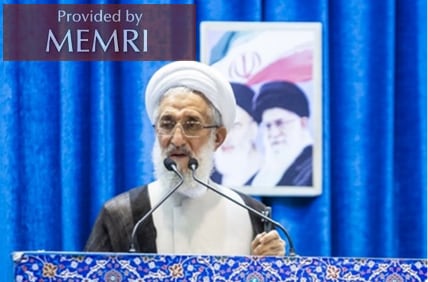
Friday preacher Kazem Sadiqi (Source: Fars, Iran, July 15, 2022)
Intelligence Minister Esmail Khatib: "Promoting The Neglect Of The Hijab Is One Of The Enemy's Plans" For Harming Iran
At the 10th Quran competition of the intelligence community, Intelligence Minister Esmail Khatib said: "The more we promote the Quran in society, the stronger the intelligence and military community will become. The Quran is our soft power. It determines our plans, policy and strategy, because it is God's word. The greatness of the Islamic Republic in the world today is thanks to the Quran.
"The enemy is striving to undermine Quranic values and norms and the spirituality of society, and promoting the neglect of the hijab is one of the enemy's plans for distancing society from the Quranic values."[12]
Vice-President for Women and Family Affairs Ensieh Khazali Underscores Narrative Of "Culture War"And "War Of Perception": The Enemy Plots Against The Hijab And Modesty
At the July 15, 2022 "Clean Living " conference, Iranian Vice-President for Women and Family Affairs Ensieh Khazali stressed that there is a war of perception, and that as part of this war the enemy seeks to fight the hijab whereas the regime's national mission is to defend it. She said: "The issue of the hijab and of modesty is one of the issues that the enemy considers and plans for in the great war of perception. The enemy essentially [targets] the religious and national identity of the [Iranian] nation, so as to change it from within and occupy our country without firing a single bullet... The fact that the enemy invests significant sums in cyberwarfare every year, and increases this budget every year, reflects the importance of this war of perception. If we fail to see this and notice this, the enemy will win this war as a result of our neglect..."
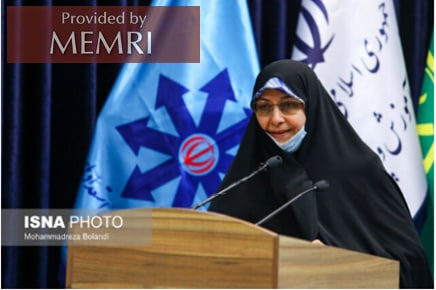
Vice-President for Women and Family Affairs Ensieh Khaz'ali (ISNA, Iran, July 15, 2022)
"The enemy is trying to corrupt society and influence our human capital. We should note that the jihab is not just a covering, but is part of the behavior and cultural conduct of women and men alike. We want a clean society and clean relationships which benefit first of all women and then the family – and that is what the enemy seeks to deprive us of"…"[13]

Bans on high heels, colorful or shiny chador, revealing clothing for men (Source: Bonyana.com, Iran, November 18, 2018)
Sajjad Nasser, Secretary Of Headquarters for Enjoining Good and Forbidding Evil In Zanjan Province: "These Headquarters Are Well Known; They [Employ] Peaceful Means, Not Violence; We Have No Women Who Fail To Wear The Hijab, Just Those Who Wear It Carelessly – And We Must Develop The Culture [Of Proper Hijab Wear]"
As stayed, one of the main regime bodies enforcing and promoting modest dress and the hijab in Iranian society is the Headquarters for Enjoining Good and Forbidding Evil, whose name is taken from Quran 3:110. In a July 5, 2022 press conference, the head of the Zanjan Province branch of the headquarters, Sajjad Nasser, said: "[Observance] of the hijab is not just the concern of women. Men too should devote the necessary attention to it... The issue of the hijab is one aspect of modesty. Today we have problems in this regard, but it is not [just a matter of] making arrests and [then closing] the file. We [also] aim to carry out cultural and informational efforts. We have considered issuing verbal warnings [to women], and we will start building [their] trust in the executive bodies. Government employees must comply with the norms [the government] promotes. Many of our problems concern deviant [phenomena that can be seen] around the city, and some of the women [who transgress] are government employees. We act to stem the increase of these deviations. The next stage will be presenting plans, and this work is done with care. All elements must pay serious attention to this matter.
"The activity of these headquarters is cultural. We do not seek to harass or pester [people]. These headquarters are well known. They [employ] peaceful means, not violence. We have no women who fail to wear the hijab, just those who wear it carelessly, and we must develop the culture [of proper hijab wear].
"We must accept that the hijab is not an impediment. It is aimed at protecting us. Our activity is cultural, and all of us, especially the officials in charge, must begin with ourselves and our families. The first step in this context is to restore hope to society, and we can promote this through cultural activity. We also ascribe importance to prevention, and in this context, we must not ignore cyberspace, which is just as important as the revolution itself, and that is a point worth noting."
Addressing the proposal to establish a popular force for enforcing modesty, Nasser said: "In the first stage, the [headquarter's] offices have begun to work on this, and in the next stage classes will be held. Obviously, everything will conform to the culture and the abilities of [each] region. The family is the basic social unit that must be rectified from within, and after this [is done] we should make efforts to reform society. The privacy and dignity of the believing citizen are very important to us. The activity of the sector [in charge of] modesty and the hijab must not be politicized. We must take care to [respect] cultural boundaries and harness the abilities of all the citizens."[14]
Iranian Military Spokesman Abolfazl Shekarchi: "A Handful [Of Women] Has Essentially Taken The Place Of The Enemy... Spearheading The [Anti-Hijab] Incitement Among Women...; The Infidel World And The Western Liberal-Democratic Culture Sees Women As A Tool Of Propaganda And Entertainment – While Islam Sees Her As Educating And Caring For Men..." In Islamic Society, It Is Considered A Terrible Shame To Follow The Example Of The Degenerate Western Society; What Can We Expect From The Liberal-Democratic Community That Today Accepts Dogs As Spouses And Children?"
On July 12, 2022, at the "education festival" titled "Faitma's Gemstones" held by the military, Abolfazl Shekarchi, Iranian Armed Forces spokesman and the head of the defensive cooperation and information department at the General Staff Of The Iranian Armed Forces, explained the regime's perception of women's role in society and the consequences of neglecting the hijab. Blaming women who neglect the hijab for the increase in divorce, mental illness, depression and insecurity in society, he added that the martyrs ascribe even greater importance to the hijab than to the ideal of martyrdom. The woman's role in Islam, he said, is to educate and care for the man, which is more noble than the role assigned to women in the infidel West, which regards them as a tool. He also called for "dealing with filmmakers and artists who undermine the foundations of modesty in the name of making films."
He said: "Our enemies have infiltrated the fabric of our society, and sadly, people on the government payroll have now joined the ranks of the devil and are fighting against the most important of religious values: the hijab. The hijab is the fruit of modesty and modesty is the root of the hijab. These two excellent values are inseparable. Today, the enemies of the religion, of God, and of Ahl Al-Bayt [a Shi'ite term for the family of the Prophet Muhammad; here it refers to the Iranian regime] are targeting these two values.
"Having failed to make any progress in 'hard warfare,' the enemies launched an offensive in the cultural arena, attacking the hijab from every direction. The armed forces have always pioneered the celebration of modesty and the hijab, promoting this important movement as a service to Zahra [i.e. Fatima, the daughter of the Prophet Muhammad and the wife of 'Ali]. For the members of the armed forces, and their dear wives and devoted daughters, it is a great honor to bear the banner of the struggle against the neglect of the hijab and against immodesty.
"The martyrs of the Sacred Defense [the Iran-Iraq War 1980-88], the martyrs who defended the holy sites [in Syria and Iraq], and the martyrs who defended [our] security clearly recommended the hijab in their wills, and even regarded the value of hijab-wearing by women as more noble than the ideal of [sacrificing] their blood. Today, the most fundamental factor in Iran's spiritual and social security is the issue of modesty and of the hijab, and it must not be ignored. Our enemies have understood the importance of this issue and are attacking this root. If they sever it, there will be no tree and no fruit.
"Although they are Muslims, many women in our community have little awareness of this issue. But there is also a handful [of women] who have essentially taken the place of the enemy and are leading and spearheading the incitement [against the hijab] among women. Sadly, some of the Iranian officials in charge of cultural issues have been negligent regarding the hijab and modesty and are mishandling this issue. Some of those in charge of [the issues of] the hijab and modesty see the harm that this dangerous flood [of immodesty] will cause the Islamic community, yet sadly do nothing special [about it]."
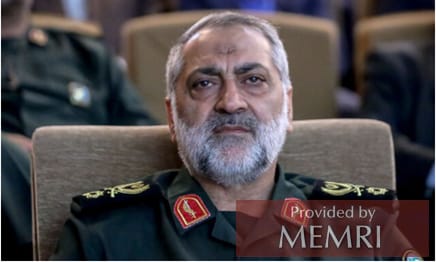
Abolfazl Shekarchi (Source: ISNA, Iran, July 12, 2022)
"Today, the result of the negligence in [wearing] the hijab is a rise in divorce, tension within the families, mental illness and depression, and insecurity in society. Likewise, it has caused great damage in the country's production and economy, and, more importantly, is preparing the ground for maneuvers by the enemies of the revolution.
"Unfortunately, today there are many moral exceptions, as a result of the failure to cover up [with the hijab] in this country. In Islamic society, it is considered a terrible shame to want to follow the example of the degenerate Western society. What can we expect from the liberal-democratic community that today accepts dogs as spouses and children?
"In the Islamic perception, women have a deeply rooted and fundamental role to play. The Islamic Revolution owes much of its success to the presence of fighting women, and the Iran-Iraq War is the most important of these [successes]. Without the strong obstacle and effective presence of women during the war, these outstanding successes would not have been achieved.
"All the successes of today were also achieved under the aegis of women. Today, the enemy is targeting the women, that is, the same point that is essential to the success of our society. This is with the aim of weakening and destroying the fundamental elements of the family. We are today in an all-out cultural war, and you, the women, must play your part as the flagbearers in this arena.
"The infidel world and the Western liberal-democratic culture sees women as a tool of propaganda and entertainment, while the religion of Islam sees her as educating and caring for men. Islam attributes the successes of the community to the care and education provided by women. This is a very big difference, and it is sad that we seek to follow in the footsteps of the culture of evil men in the West.
"Our two fundamental tasks are: [First,] enjoining good, and raising awareness among the masses – which must be carried out with the support of all cultural bodies. Second, forbidding evil and dealing with those who create immodestly. Likewise, we must deal also with film producers and artists who, in the name of producing films, uproot modesty."[15]
Iranian Army Deputy Commander Mohammad Mahmoudi: "With Her Hijab, A Woman Can Attain Top Degrees And Perfection"
Also at the "Fatima's Gemstones" education festival held by the military, Iranian Army Deputy Commander Mohammad Mahmoudi said: "Considering that [the matter of] modesty and the hijab are emphasized by God in Verses 30 and 31 of Surat An-Nur [24] in the Quran, attention to this will lead to stronger families, [whereas] laxity and negligence will cause rot in society. In effect, women's maintaining the hijab and modesty strengthens their character. Islam has given us this perception of this matter. Likewise, the directives of the founder of the Islamic Revolution, the Imam [Ayatollah Ruhollah] Khomeini, and the supreme commander of the armed forces [Supreme Leader Ali Khamenei] stress the preservation of modesty and the hijab many times... With her hijab, a woman can attain top degrees and perfection, and can advance in society and honor bountiful God's gift to humanity [i.e. herself]..."[16]

Mohammad Mahmoudi (Source: Fars, Iran, July 11, 2022)
*A. Savyon is Director of the MEMRI Iran Media Project.
[1] Irna.ir/news, September 19, 2021.
[2] Iranintl.com/202209199159, September 19, 2022.
[3] President.ir/fa/139623, September 19, 2022.
[4] The hijab covers the hair and leaves the face uncovered; the chador is a type of hijab that covers the entire body.
[5] The Iranian regime attributes the anti-hijab campaign waged in recent years by the expatriate Iranian activist journalist Masih Alinejad to the U.S. It should be noted that the Iranian regime has attempted to force her to stop her campaign, pressuring her family members in Iran and even trying to kidnap her from her home in New York and bring her to Iran.
[6] ISNA (Iran), July 12, 2022.
[7] Farsi.khamenei.ir/speech-content?id=50689, July 27, 2022.
[8] President.ir/fa/137763, July 5, 2022.
[9] Tasnim (Iran), July 8, 2022.
[10] Shafaqna (Iran), July 5, 2022.
[11] Fars (Iran), July 15, 2022.
[12] ISNA (Iran), July 26, 2022.
[13] ISNA (Iran), July 15, 2022.
[14] ISNA (Iran), July 5, 2022.
[15] ISNA (Iran), July 12, 2022.
[16] Fars (Iran) July 11, 2022.


